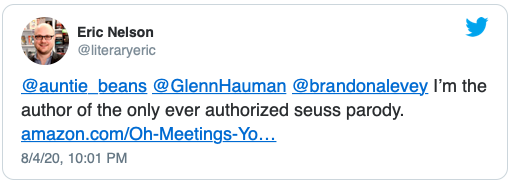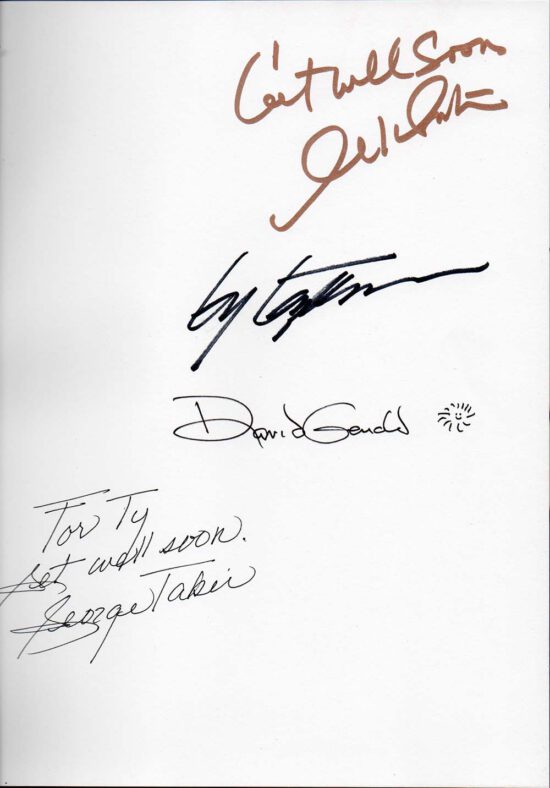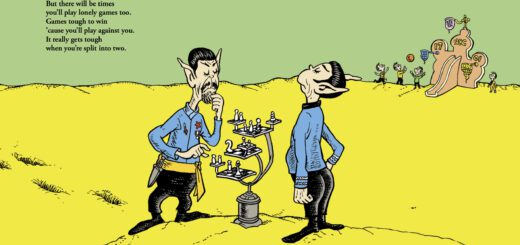Oh, The Place We Boldly Stop.
The Dr. Seuss Enterprises lawsuit against us is finally over.
In August 2016, we put up a Kickstarter for Oh, The Places You’ll Boldly Go!, a mash-up of Star Trek and Dr. Seuss to be written by David Gerrold, drawn by Ty Templeton, edited by Glenn Hauman, and published by ComicMix LLC later that year. DSE sent us a cease and desist letter on September 27, 2016. (Yes, the legal wrangling lasted longer than the Enterprise’s original five-year mission.) DSE filed a DMCA motion to take down the Kickstarter campaign on October 7, and filed suit against us on November 10, 2016, alleging copyright infringement, trademark infringement, and unfair competition.
We put up a good fight. We defeated the trademark infringement and unfair competition claims, and that win was affirmed on appeal. We also won summary judgment on the claim of copyright infringement, though that was reversed on appeal. The court set a pretrial schedule in September 2021 and we were well positioned to have a jury resolve whether or not you could see this book.
And yet, today we’re announcing that we and DSE submitted a proposed consent judgment for the suit, and that the Honorable Judge Janis L. Sammartino granted it on Friday, October 8, 2021 and closed the case.
Why? The simple truth is— we ran out of time.
This past year, Ty was diagnosed with Stage 3 colorectal cancer. This has required him to undergo months of chemotherapy and radiation treatment, just to prepare him for the needed surgery—which will then require weeks of recuperation until he recovers enough to go through six MORE months of chemo and radiation, and then MORE surgery after that. This has affected his ability to work, to draw, and to do any of the things an immunocompromised person shouldn’t do, especially in the middle of a global pandemic.
And the trial schedule would have been smack in the middle of all of that. After five years of sometimes ridiculous litigation and with the pre-trial deadlines looming, as Ty’s collaborators and friends, we refused to put him through any additional stress that could in any way impinge on his health and recovery. To the credit of the people at DSE, they didn’t want to put Ty through that either. So we joined in a motion to end the suit the day before Ty’s surgery, in order to alleviate the less serious pain in his ass so he can deal with the far more lethal and literal pain in his ass.
In the consent judgment, DSE concedes some of our defenses and we concede some of their claims. Unfortunately, the terms stipulate that even though the book is complete, we won’t be able to present Oh, The Places You’ll Boldly Go! to you for another forty years, when the Dr. Seuss copyrights are set to expire and his books enter the public domain. (We can start taking preorders in January 2062, so set your calendar reminders now.)
We still passionately believe in and stand for creators’ rights, including fair use, and we still maintain that Boldly is a fair use that could not have harmed DSE in any way, now, five years ago, or in forty years. Unfortunately, the Ninth Circuit Court of Appeals’s view of fair use makes it very difficult to overcome a well-heeled copyright holding corporation if it wants to stand in the way (anyone who thinks “corporations are people” has never seen a corporation in a cancer ward) and they decided that the book was over the line. We’re looking forward to the day when you can finally see the full book for yourself and make your own determination about it—until then, it’s like writing a book report by just looking at the cover, never seeing what’s inside.
It has been a long five-year mission filled with many absurdities. At one point, Universal Pictures asked us to help promote “The Grinch” DVD release, so DSE could make more money to bash over our heads. At another point, DSE paid an “expert witness” who got an artist to redraw our book in the most dreadful way imaginable, and then did a trademark survey asking shopping mall customers to compare Ty’s artful mix of Seuss and Trek with that hack job. We’re still wondering how our book referencing a single illustration from How The Grinch Stole Christmas could have taken “the heart of the work,” as the Ninth Circuit Court of Appeals thought, when the illustration in question shows neither the Grinch, Christmas, or anything being stolen. And less than thirty-six hours after the Ninth Circuit reversed the fair use ruling, we got to watch Saturday Night Live air a sketch about the Grinch in a Whoville three-way, with nary a peep from DSE.
We’re also grimly amused about how we had to fight a fair use case while DSE’s own publisher, Penguin Random House, put out their own unauthorized parody, Oh , The Meetings You’ll Go To! (Although there is some question as to whether or not Meetings is officially sanctioned by Dr. Seuss Enterprises, as the copyright page of Meetings makes no mention of a DSE license, yet this since deleted tweet from Eric Nelson on August 4th, 2020 says otherwise…)

But when we were sued two days after Election Day 2016, we knew that letting anyone with lots of money, name recognition, and power have the ability to shut down even the gentlest of parodies and mildest of commentaries about them unchallenged was an extremely bad precedent to set for the future—if for no other reason that we make up for one another’s biases by being able to criticize each other, whether we are children’s book authors or circuit court judges.
We can take satisfaction in many of the victories and precedents this case has set, including:
- The Ninth Circuit made it explicit that mash-ups can be fair use. (Just not, apparently, ours.)
- The District Court’s summary judgment ruling held that there are no exclusive trademark rights in an artistic style, or a distinctive font or typeface.
- In fact, the trademark infringement and unfair competition claims wound up a total rout. They were dismissed based on nominative fair use in 2017. DSE renewed them, and we won judgment on the pleadings over its claims about the book’s title based on the Rogers/First Amendment test in 2018. We won the “that’s not even a thing” issue over the Seussian art style and typeface in 2019. And in 2020 the Ninth Circuit affirmed everything under Rogers and the First Amendment.
While we’re not entirely pleased with the case’s outcome, we remember the words of historian Richard Hofstadter, who observed that sometimes people must “endure error in the interest of social peace.” If we were ultimately unable to persuade the Ninth Circuit to reduce the amount of error involved in determining fair use for creators, we’ve done what we can to forge a path for future fair use activists.
There are many people we’d like to thank for helping us go boldly, as we believe that, as our book says, no one goes forward alone. First and foremost: our lead attorney Dan Booth of Dan Booth Law, who fought the good fight with the strength of a hundred lawyers against a firm with four thousand lawyers. We also give thanks to Michael Licari, now in-house counsel at Veteran Benefits Guide, Dan Halimi, now at Halimi Law Firm, T.C. Johnston at Internet Law, Joanna Ardalan of OneLLP, who appealed our case to the Supreme Court, and Ken White of Brown White & Osborn LLP, who sent up the Popehat signal that brought us much needed assistance in the first place. And we thank Dr. Joshua Gans, our expert witness, who generously donated his time and testimony and worked under ridiculous constraints.
We’d also like to thank the people who filed amici briefs taking our side:
Francesca Coppa, Stacey L. Dogan, Deborah R. Gerhardt, Leah Chan Grinvald, Michael Grynberg, Mark A. Lemley, Jessica Litman, Lydia Loren, David Mack, William McGeveran, Mark P. McKenna, Lisa P. Ramsey, Pamela Samuelson, Jessica Silbey, Rebecca Tushnet, Magdalene Visaggio, the Electronic Frontier Foundation, the Organization For Transformative Works, Public Knowledge, and their counsel Chris Bavitz, Mason Kortz, Phillip R. Malone, Meredith Rose, Eric Stallman, and Kit Walsh.
And we’d like to also thank Mike Gold, Martha Thomases, Brandy Hauman, Keiren Smith, Pam Hauman, Shann Dornhecker, Mark Treitel, Joshua Masur, Katherine Trendacosta, Heidi Tandy, Meredith Rose, Brian Jay Jones, Mike Godwin, Margot Atwell, Camilla Zhang, Oriana Leckert, Allison Adler, Michael C. Donaldson, Film Independent, the International Documentary Association, and Steve Saffel.
We’d very much like to thank United States District Judge Janis L. Sammartino, who presided over our case with patience, fairness, wisdom, and thoughtfulness, and all of the staff that supported her.
And finally, we’d like to thank all of the Kickstarter backers who wanted to make this book a reality, all the supporters who helped cover (the start of) our legal expenses, and all of the journalists and scholars who followed and reported on our case. We are grateful for your generosity and faith, and are very disappointed that we can’t show you what you’ve been waiting years to see. At least not yet.
For those interested, the case is Dr. Seuss Enterprises LP v. ComicMix LLC et al.,; case number 3:16-cv-02779 in the United States District Court for the Southern District of California, and case number 19-55348, in the United States Court of Appeals for the Ninth Circuit.
P.S.: There’s two more last minute “thank yous.” The proposed consent judgment was submitted this past Tuesday, October 5. On Wednesday, October 6, Ty had his surgery, which went well. And on Thursday, October 7, two guys joined David and Glenn in sending get-well notes to Ty—a Mr. Shatner and a Mr. Takei.

Thanks, captains.















